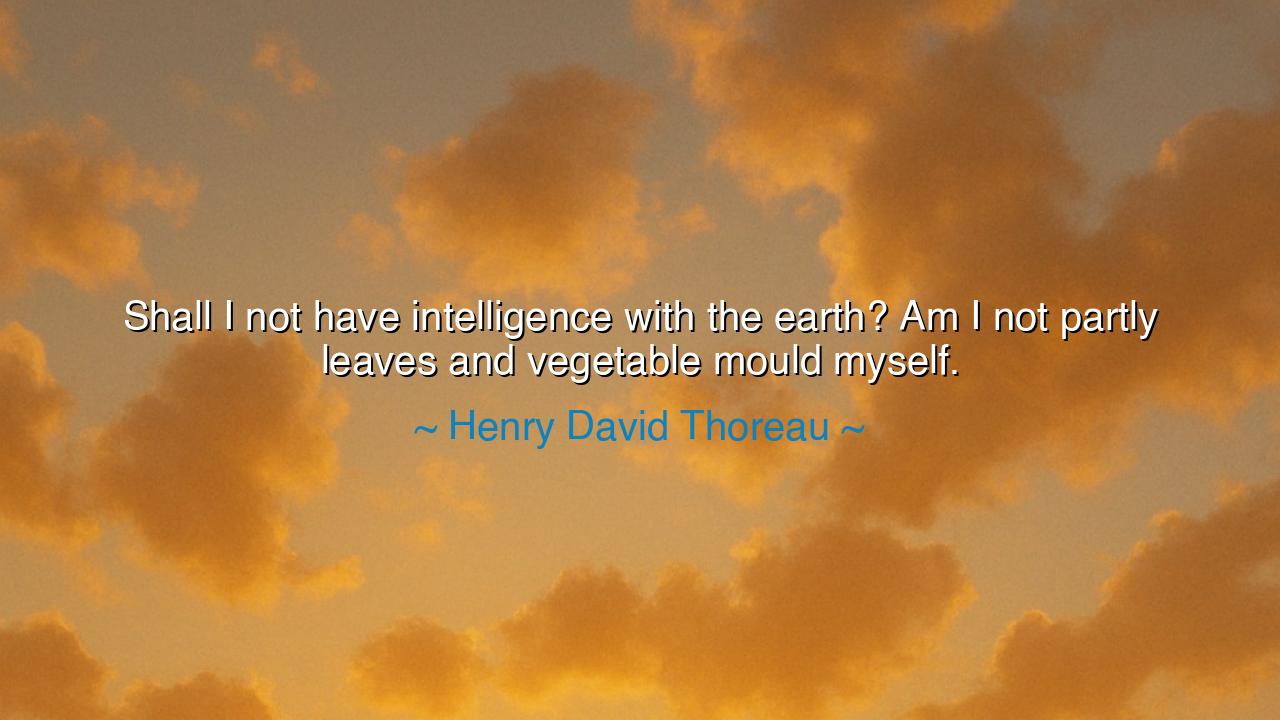
Shall I not have intelligence with the earth? Am I not partly
Shall I not have intelligence with the earth? Am I not partly leaves and vegetable mould myself.






"Shall I not have intelligence with the earth? Am I not partly leaves and vegetable mould myself." – Henry David Thoreau
In the stillness of the forest, where the trees whisper and the earth breathes beneath our feet, the wisdom of nature speaks to those who listen. Thoreau, in this simple yet profound reflection, beckons us to recognize the intelligence that resides not only in the human mind but also in the soil beneath us, the air around us, and the leaves that rustle in the wind. He invites us to acknowledge the connection between humanity and the natural world, a bond that is as old as time itself, and yet often overlooked in the rush of modern life.
To ask whether one may have intelligence with the earth is to acknowledge that we are not separate from nature but intricately intertwined with it. Thoreau’s words suggest that we, too, are part of the great cycle of life, not merely observers but active participants in the unfolding of the world. Just as the leaves grow, change, and eventually return to the earth, so too does the human soul partake in the grand rhythm of life. Intelligence, as Thoreau sees it, is not confined to books or classrooms but exists in the earth itself, in the deep roots of the trees, the flow of the rivers, and the quiet wisdom that the world offers to those who are willing to listen.
Consider the story of Wangari Maathai, the Kenyan environmental activist who won the Nobel Peace Prize for her efforts in advocating for sustainable development and the preservation of the environment. Through her Green Belt Movement, Maathai sought to reconnect people with the land, urging them to plant trees, restore their environment, and recognize the deep connection between the land and their own well-being. Maathai’s life was a testament to the truth that human intelligence is not separate from the earth, but is an extension of it. In her work, she embodied Thoreau’s wisdom, showing us that our actions upon the earth are a reflection of the health of our souls.
Yet, Thoreau’s question is more than just an observation of nature’s wisdom. It is a call to action, urging us to find intelligence in the natural world, to listen deeply to the voices of the wind, the rustling leaves, and the earth beneath our feet. In this, we are reminded of the ancients who understood the deep connection between man and nature. The Greek philosopher Heraclitus spoke of the interconnectedness of all things, stating that "everything flows," acknowledging that nothing exists in isolation. Thoreau, much like Heraclitus, recognizes that the intelligence of the earth is sacred, and that through understanding it, we find a deeper understanding of ourselves.
The lesson here is one of humility and reverence. In a world where the noise of technology and progress often drowns out the wisdom of the earth, Thoreau calls us to return to a place of stillness and reflection, to recognize that the wisdom we seek is often found not in the pages of books or the bustle of human society, but in the quiet, sacred spaces of nature. True intelligence lies in the ability to hear the earth’s voice and to act in accordance with its rhythms, to recognize our dependence on the land, and to care for it as we care for ourselves.
To follow Thoreau’s call is to embark on a journey of self-awareness and connection. It is to stand in the presence of nature and ask, "How am I like the leaves? How am I part of this vast, intricate system?" When we understand that our bodies are composed of the same elements that make up the soil, the air, and the water, we can no longer view ourselves as separate from the earth, but as part of its living, breathing whole. This awareness demands a shift in our attitudes toward environmental stewardship and our responsibility to preserve and protect the natural world for future generations.
The actions we take, then, are not merely for our own benefit but for the health of the world that sustains us. To live in harmony with the earth, as Thoreau suggests, is not an abstract ideal but a practical, everyday choice. Whether it is by planting a tree, conserving water, reducing waste, or simply taking a moment to breathe in the beauty of the world around us, we honor our connection with the earth and recognize that intelligence is not confined to human ingenuity alone, but is a gift shared between all living things. Let us walk lightly upon the earth, remembering that in its wisdom, we find the wisdom to live better, to care deeper, and to connect with the eternal cycle of life.






AAdministratorAdministrator
Welcome, honored guests. Please leave a comment, we will respond soon